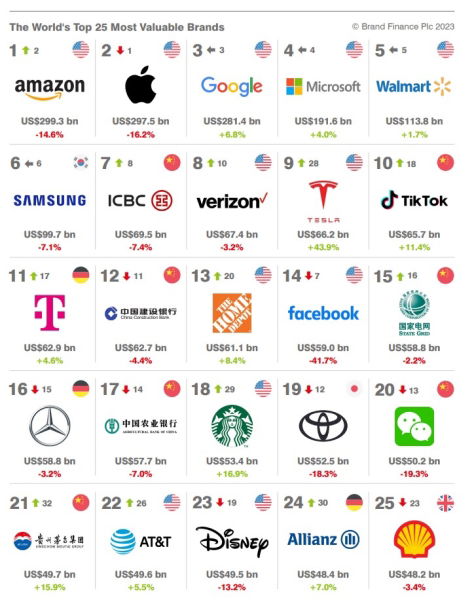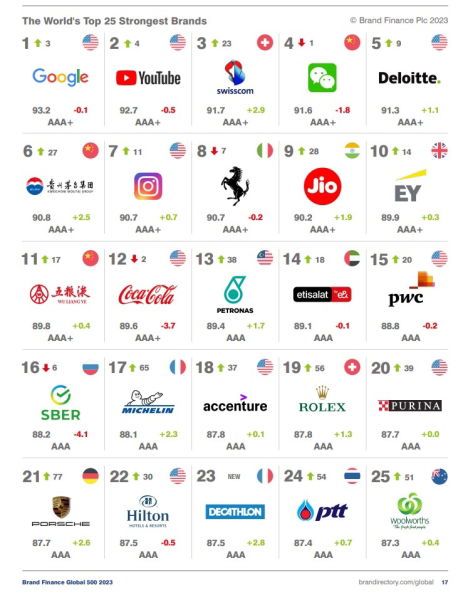
Brand Finance: A look at the leading brands in SG, and why tech brands tumbled
share on
Despite the global tech downturn, Singapore brands ranked within the world’s 500 most valuable brands, posted double-digit percentage growth in their brand values DBS (brand value up 21% to US$10.5 billion) led the pack and remained Singapore’s most valuable brand, followed by UOB (brand value up 13% to US$5.5 billion) and OCBC (brand value up 13% to US$5.4 billion), said brand valuation consultancy Brand Finance’s Global 500 2023 report.
The report was launched in Davos during the World Economic Forum, and Brand Finance’s research showed that stronger revenues were main reasons for brand value growth of all three brands.
Important contributors to stronger revenues included acquisitions such as DBS’ acquisition of Lakshmi Vilas Bank and investment in Shenzhen Rural Commercial Bank, and UOB's acquisition of Citigroup's retail-banking business in Malaysia, Thailand, Indonesia and Vietnam. In addition, the region's economic recovery alongside a more aggressive pace of rate tightening by the US Federal Reserve could continue to boost profits.
Alex Haigh, managing director – Asia Pacific of Brand Finance, said, “Singapore’s strength in financial services has seen its brands perform well this year. DBS, UOB and OCBC have all taken advantage of this moment in the sun to make intelligent investments and continuously improve their services – particularly in the digital space.”


The brands in Asia making waves
In the Asia Pacific region, Korean electronics brand Samsung Group (brand value down 7% to US$99.7 billion) is the most valuable brand. Since the beginning of the COVID-19 pandemic, technology and electronics have assumed great importance for individuals, consumers and governments all across the globe, and Samsung has been a significant manufacturer of such items. The increase in demand and necessity of advanced electronic products has led to growth in the brand’s perceptions among consumers.
Following Samsung, Chinese banking brand ICBC (brand value down 7% to US$69.5 billion). The brand has been involved in upcoming new sectors including green finance and sci-tech innovation which has led to an increase in its performance. Fellow Chinese brand Moutai (brand value up 16% to US$49.7 billion) is the strongest brand within the Asia Pacific region. The brand continues to lead the sector with its iconic drink which is a unique, aspirational and market dominating product in China.
The brand has been adept in supplying its product to Chinese customers by leveraging its iMoutai mobile application which has over 10 million users for online payments and e-commerce fulfilment. The app also allows consumers to purchase the special drink in new and engaging ways.
Telecommunications giant Chunghwa (brand value up 22% to US$5.3 billion) is the second strongest brand in Asia. The brand is leading the way with a sustainable outlook to operations by enhancing its energy efficiency across its 5G network performance. The brand aims to establish a greener and digital future across the board by providing low carbon options to its customers.
Tech brands take a tumble
Globally, Amazon reclaimed top spot as the world’s most valuable brand despite its brand value falling 15% from US$350.3 billion to US$299.3 billion in tandem with a fall in brand strength.
Brand Finance’s research found that customer perception of customer service at Amazon had also fallen – at the same time as delivery times have lengthened – and in concert with this, consumers have become less likely to recommend Amazon to others.
Apple (brand value down 16% to US$297.5 billion) has in the meantime fallen to be the world’s second most valuable brand with its brand value falling from US$355.1 billion. This year’s fall in brand value relates to a fall in forecast revenue as a disrupted goods supply chain and a constrained labour market are expected to limit supply of its marquee hardware products.
There was a total of 48 tech brands that featured in the ranking, two down from the 50 in 2022, after Snapchat and Twitter dropped out. Other tech-focused brands to lose value include Samsung Group (brand value down 7% to US$99.7 billion), Alibaba.com (brand value down 56% to US$10.0 billion), Facebook (brand value down 42% to US$59.0 billion) and WeChat (brand value down 19% to US$50.2 billion).
On the positive side, Instagram (brand value up 42% to US$47.4 billion) and LinkedIn (brand value up 49% to US$15.5 billion) have grown in the tech sector, with the brand value of each growing due to well-executed strategy to commercialise their services.
Some of the other big winners in brand value include electric car manufacturers Tesla (brand value up 44% to US$66.2 billion) and BYD (brand value up 57% to US$10.1 billion) as demand grows for electric cars as part of a broader transition to a low carbon economy.
David Haigh, chairman and CEO of Brand Finance, said technology brands across the world have lost significant value in response to shifting demand patterns. Inflation has affected brands across many sectors, but as consumer habits partially revert to pre-pandemic patterns, demand for the services of tech brands has been hit particularly hard. “Additionally, disrupted supply chains, labour shortages and greater obstacles to financing have left their mark,” he said.
Related articles:
Brand Finance: PETRONAS CEO only ASEAN leader ranked in top 100 globally
Brand Finance: Only 7 ASEAN brands listed under top 500 global brands ranking
share on
Free newsletter
Get the daily lowdown on Asia's top marketing stories.
We break down the big and messy topics of the day so you're updated on the most important developments in Asia's marketing development – for free.
subscribe now open in new window
